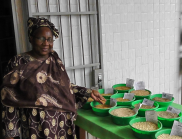Australian and African scientists unite on African food crisis
Funded by Australian Agency for International Development (AusAID), the focus of the A$15million partnership is to address food insecurity in regions which face famines most years.
Representatives from the West and Central African Council for Agricultural Research and Development (CORAF/WECARD[i]) based in Senegal are working with CSIRO to finalise the next phase of this partnership.
In a first for the region, more than 30 national agricultural research institutes, 80 African scientists and 400 farmers, extension officers, processors and sellers of agricultural produce are working across 10 countries. This combination of African and Australian expertise is delivering a long term approach to tackling food insecurity and animal health issues in West and Central Africa.
Dr Brian Keating, director of CSIRO’s Sustainable Agriculture Flagship, said Australia responds to crises like the Horn of Africa famine, and now the Sahel crisis, through important emergency relief initiatives.
“However, the food systems across these regions are fragile and we must focus on underlying issues to find long-term solutions. Across Africa, low production and inefficient distribution of food is linked to issues of limited fertiliser and pesticide availability and use, inadequate markets, and poor access to animal health information and solutions for farmers,” Dr Keating said.
“Our partnership with Australia is and will be helping deliver long term solutions to enable Africans solve these difficult challenges.”
Dr Aboubakar Njoya, Director of Programmes, CORAF/WECARD
Dr Aboubakar Njoya, Director of Programmes, CORAF/WECARD, said per-hectare yields for most crops across the whole of sub-Saharan Africa are among the lowest in the world.
“Seasonal events also push areas across the region into famine much more readily than more resilient regions around the world, like Australia where you’ve learnt to cope with climate variability and low soil fertility,” Dr Njoya said.
West and Central Africa’s population is about 360 million. By 2030 it is anticipated to exceed 500 million. A massive increase in crop yields is needed to meet the immediate demand for quality food and nutritional requirements, let alone projected demand in 2030.
Animal health is also a critical focus of the partnership. One example of research success so far has been in understanding the infestation of the cattle tick Boophilus microplus (Bm), an aggressive tick species introduced in West and Central Africa which causes severe weight loss in infested cattle, cripples them and transmits deadly diseases.
“Cattle are like money in the bank for African herdsmen, a quarter of the region’s population rely on livestock for their livelihoods, so animal health issues really need to be addressed,” Dr Njoya said.
“Now that we know what this tick species is we can work with farmers to help minimise its impact – it will take a big effort and results will take time, but it’s an important step to helping African farmers and families have more food and secure their incomes”.
Dr Chris Prideaux, senior research scientist at CSIRO, said the Australian beef industry also suffers from this tick species.
“While we haven’t been able to eradicate it, we have developed strategies to reduce its impact. This partnership enables us to share that knowledge with African scientists and farmers. We have a big program focused on processing cattle blood samples across Benin and Mali, we’ve developed strong links with the relevant Ministries and also key NGOs in the region,” Dr Prideaux said.
The project team will work with farmers to monitor animal health of cattle, and with Government workers to develop control strategies and education programs for farmers.
“We need to build a resilient Africa by investing in our human capital and aligning our policies and practices to achieve integrated and sustained growth in the agricultural and livestock sectors,” Dr Njoya said.
“Our partnership with Australia is and will be helping deliver long term solutions to enable Africans solve these difficult challenges.”
Dr Keating said this partnership is an example of Australian science sharing its knowledge with international partners.
“At the same time our Australian scientists are bringing back lessons and new insights that can be applied here to Australian agriculture. Australian agricultural research has enabled massive agricultural advances in food production and we are recognised world-wide for our expertise in dryland farming systems and animal health – we have a lot to offer Africa,” Dr Keating said.
Media resources
Click image for high resolution version.
Note for media: CORAF/WECARD’s Dr Aboubakar Njoya and CSIRO’s Dr Brian Keating and Dr Chris Prideaux are available for media interviews.

